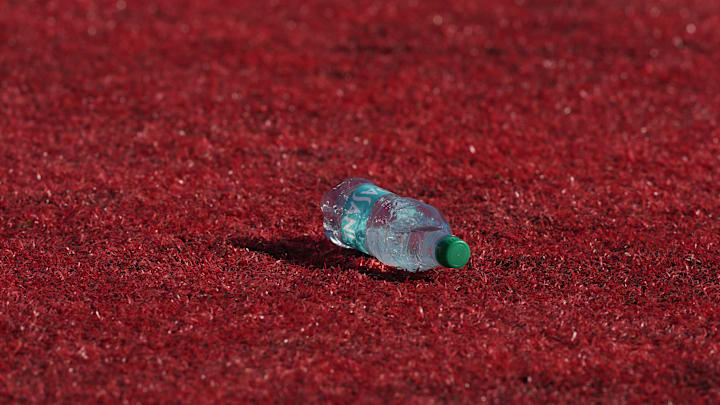In what feels like a concerning trend across college football, Ohio State fans followed in Texas’s footsteps by trashing their own field following a controversial call in the Buckeyes' 21-17 win over Nebraska.
With the game hanging in the balance late in the fourth quarter, Ohio State linebacker Arvell Reese was ejected for targeting. The call stood after review, sparking a wave of outrage among the home crowd in Columbus. What followed was a scene eerily reminiscent of the incident in Austin just a week ago, where Texas fans littered the field with debris after a controversial officiating call.
As the targeting penalty was enforced, Ohio State fans began to express their frustration by throwing water bottles, beer cans, and other objects onto the field. The delay was short, with officials needing a little extra time to ensure the players' safety before the game could resume. Even Ohio State head coach Ryan Day couldn’t contain his anger, throwing his headset in frustration, which earned him a sideline warning from the officials.
Ryan Day is not happy with the targeting call as Ohio State fans begin to toss water bottles onto the field calling for a reversal. pic.twitter.com/nzim8SmG62
— Stephanie Otey (@StephOtey) October 26, 2024
For many, this behavior felt inevitable. The SEC had just threatened Texas with the loss of alcohol sales at their games after a similar incident during their matchup against Georgia, where Longhorn fans erupted in a fury following a pass interference call.
The debris thrown on the field in that game not only delayed play but also garnered the SEC's attention, leading to significant penalties and warnings for future conduct.
In Columbus, there were not as many water bottles as the Texas game, but the point still stands: You cannot throw stuff on the field just because you're angry.
They’re throwing beer, Fireball and cheese at Ohio Stadium. pic.twitter.com/sxXHYU0WKZ
— Amie Just (@Amie_Just) October 26, 2024
The Buckeyes were fortunate to escape with a victory after Jordan Hancock’s game-sealing interception, but the postgame discussion has largely centered around the behavior of the Ohio State fans. While Nebraska fans were also frustrated with officiating, Ohio State's own fanbase took things to a different level, echoing the chaotic scenes from Texas.
Ohio State’s fan behavior adds fuel to the debate over alcohol sales at sporting events, especially with the Big Ten facing increased scrutiny after recent fan incidents.
Though the Buckeyes held on for a win, the focus on this kind of behavior casts a shadow and should require the Big Ten to step in, the same way that the SEC If this trend continues, more universities might face consequences similar to what Texas is experiencing.
